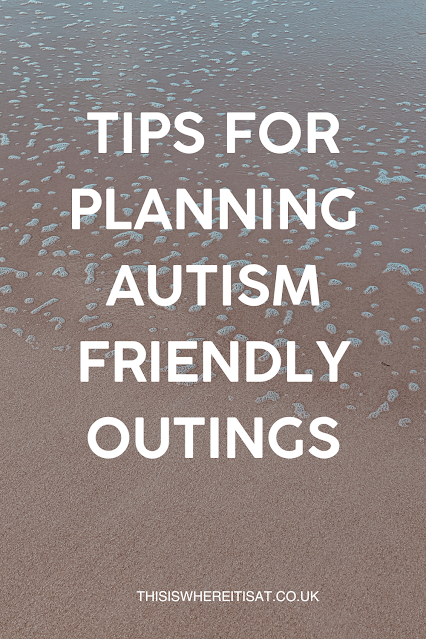Hey readers,
Planning a day out can be a fun adventure, but when you're planning for someone with autism, it requires a bit more thought and preparation to ensure it's a positive, manageable experience.
Autistic individuals can experience the world differently, with heightened sensitivities to sounds, sights, smells, and social interactions.
Whether you're a parent, caregiver, teacher, or friend, this guide offers practical, compassionate tips to help you plan autism-friendly outings that are both enjoyable and inclusive.
1. Know the Individual’s Needs and Preferences.
Every autistic person is different.
Some may love museums but dislike crowds; others may thrive outdoors but struggle with unpredictable weather. Start by asking (if they can communicate their preferences) or observing:
* What environments do they enjoy or avoid?
*Are there specific sensory triggers (e.g., loud noises, bright lights)?
* What are their favourite activities or interests?
* How do they respond to new or unfamiliar situations?
Understanding their comfort zones will help you choose the right destination and plan accordingly.
Some venues are naturally more autism-friendly than others. Look for places that offer:
Quiet hours or sensory-friendly sessions: Many museums, aquariums, theatres, and even amusement parks now offer designated times with reduced noise, dimmed lights, and smaller crowds.
Accessibility features: Noise-cancelling headphones for rent, quiet rooms, staff trained in autism awareness, etc.
Clear layout and signage: Simple navigation helps reduce anxiety, especially in large or unfamiliar environments.
When in doubt, call ahead or check the venue’s website to see what accommodations they offer.
3. Prepare with Visual Supports.
Visual schedules, social stories, and checklists are incredibly helpful in easing anxiety and setting expectations.
Visual schedule: Outline the day's events with pictures or icons, including times for meals, breaks, and transitions.
Social story: A short story that describes the outing in detail, from leaving the house to returning, highlighting what to expect and how to behave.
Checklist: A list of items to bring (e.g., noise-cancelling headphones, snacks, favourite toy, ID bracelet) can help build independence and a sense of control.
4. Pack a Sensory Kit.
A sensory kit can provide comfort and support if sensory overload occurs. Items might include:
* Noise-cancelling headphones or earplugs.
* Sunglasses or a hat (to block bright lights).
* Fidget toys or sensory objects.
* A favourite blanket or stuffed animal.
* Chewy snacks or gum for oral sensory needs.
Tailor the kit to the individual's specific sensory profile.
5. Practice Before the Outing.
If the outing involves something new or potentially overwhelming (like taking public transport or going to a large event), practice it in steps:
* Visit the location during a quiet time.
* Watch videos or look at pictures of the venue.
* Rehearse behaviours like waiting in line or asking for help.
Small, low-pressure visits can help build familiarity and confidence.
6. Plan for Flexibility.
Things may not go exactly as planned and that’s okay.
Have backup plans, safe spaces, or escape routes ready in case the outing becomes too overwhelming.
* Choose venues with quiet spaces to take breaks.
* Avoid rigid timelines; leave room for breaks or changes.
* Be ready to leave early if needed without viewing it as a failure.
Flexibility is key to keeping the outing positive and stress-free.
7. Use Communication Tools.
Not all autistic individuals communicate verbally. Have communication tools ready, especially in busy or unfamiliar places:
* PECS (Picture Exchange Communication System).
* AAC devices (Augmentative and Alternative Communication).
* Communication cards with common requests or needs (“I need a break,” “I’m hungry,” etc.).
Also, help staff understand how best to interact if needed. Some parents carry a simple explanation card for this purpose.
8. Prepare for Transitions.
Transitions between activities especially when ending something enjoyable can be particularly challenging. Here are some strategies:
* Give plenty of warning before transitions ("10 more minutes").
* Use countdown timers or visual timers.
* Offer a preferred activity or reward after the transition.
* Use consistent language and cues.
Smooth transitions help reduce anxiety and meltdowns.
9. Bring Comfort Items and Reinforcements.
Outings can be tiring and unpredictable.
Having a familiar item or positive reinforcement can provide comfort and motivation:
* Bring a favourite toy, blanket, or photo.
* Offer praise and small rewards for participation.
* Keep snacks and drinks handy to avoid hunger-related stress.
These small touches can make a big difference.
10. Debrief Afterwards.
After the outing, take time to reflect on what went well and what could be improved:
* What parts were enjoyable or challenging?
* Was there anything unexpected or overwhelming?
* How did they cope, and what helped?
* Would you do this outing again?
Use this feedback to fine-tune future outings. Celebrate successes no matter how small!
Bonus Tip: Include the Individual in the Planning Process.
Whenever possible, involve the autistic person in planning the outing.
This gives them a sense of control, builds confidence, and increases the chances they’ll enjoy the experience.
Let them:
* Choose the destination.
* Help pack their bag.
* Create their own visual schedule,
Empowerment leads to engagement.
Autism-friendly outings don’t have to be elaborate or expensive.
What matters most is that the experience is respectful, comfortable, and tailored to the individual’s needs.
With preparation, patience, and a bit of creativity, outings can become wonderful opportunities for learning, connection, and joy.
Remember: it’s not about doing everything “perfectly.”
It’s about creating meaningful experiences where everyone feels valued and included.
Resources You Might Find Helpful:
*Autism Speaks Sensory-Friendly Events Calendar - https://www.autismspeaks.org.
* National Autistic Society – Autism-Friendly Venues (UK) - (https://www.autism.org.uk).
* AMC Sensory-Friendly Film - https://www.amctheatres.com/programs/sensory-friendly-films.
* Local autism support networks or Facebook groups often share regional tips and events.
Have you found an amazing autism-friendly venue or strategy? Share your experience in the comments below.
I would love to hear what works for you.
Cheers for reading X






.png)


No comments